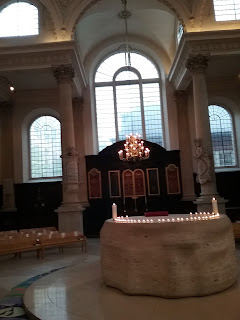You’ll Never Walk Alone, along with other songs from musicals, has been included as a hymn in the BBC’s hymn book. Ian Barclay commenting on this in The Guardian wrote that the Songs of Praise programme producers had come to realise that secular songs from shows have taken on some on the status of folk hymns, addressing the spiritual and pastoral needs of many people. Taken out of its context in Carousel, where it is sung by a dead father who has returned to life for one day to the daughter he never knew, it can be sung as a statement of belief that, as Psalm 23 states, God will be with us as we walk through the valley of the shadow of death or through the storms of life.
"When you walk through the storm
Hold your head up high
And don't be afraid of the dark
At the end of the storm
There's a golden sky
And the sweet silver song of the lark
Walk on, through the wind
Walk on, through the rain
Though your dreams be tossed and blown
Walk on, walk on, with hope in your heart
And you'll never walk alone
You'll never walk alone"
Our two readings today (Genesis 21.5, 8-20 & Matthew 8: 28 – end) speak about two storms and the different ways in which God is with people in those storms. The storm in the story of the two men in Gadara is not external but internal. Many of us experience periods of mental ill health when we feel overwhelmed by feelings and emotions, fears and anxieties which rage inside and threaten to overwhelm us. For some of us, the storm of those emotions becomes a more permanent feature of our lives and begins to affect the way in which we relate to others and the extent to which we are able to participate in society. For some, too, the things we use initially to bring some relief from those emotions – drink, drugs, sex, violence – also end up controlling our reactions and responses and ultimately change who we are as people. The two men in this story seem to have been experiencing that kind of internal storm.
The storm for Hagar is firstly an experience of rejection, as Abraham sends her and her son Ishmael away from the family and secondly of wilderness, as the two of them wander in the desert with no help and increasingly little chance of survival.
But in both stories God was there in the storm. The men in Gadara are released from their internal storms, while Ishmael and Hagar find water and a new place to live. God goes with us through the storms of life until we find ourselves on the other side. That is the promise of You’ll never walk alone and of Psalm 23; even though we walk through the valley of the shadow of death, we will fear no evil, for God is with us; his rod and your staff, they comfort us.
God can release the internal storm from with us. In times of crisis and distress we often keep our emotions bottled up inside us until eventually they explode in anger and violence. God can be the escape valve, the person that we can always turn to, the one who is always there to listen and with whom we can pour out all those pent-up emotions releasing the storm within.
God can be the one who leads to refreshment and new possibilities when it seems as though everything around us is barren and wherever we look there is no sign of hope on the horizon.
We may be in the middle of some storm ourselves today as we sit and listen. We may need the internal storm in our lives to be released in peace. We may have come through storms in our lives but still be bearing the scars or wondering where God was at that time. We may need to take this message to our hearts now because there are storms on the horizon. If that is so, we need to know in our hearts that we do not walk alone. That if we look for him we will see God going with us through the storm. That if we trust him we will come to that place of peace where the storm clouds have blown over and we see the golden sky and hear the sweet, silver song of the lark.
Let us pray that we will recognise God with us in the storms of our lives asking for the faith to come through the storm, for release of our internal storms, and for the stilling of our external storms.
------------------------------------------------------------------------------------------------------
Katherine Jenkins - You'll Never Walk Alone.



